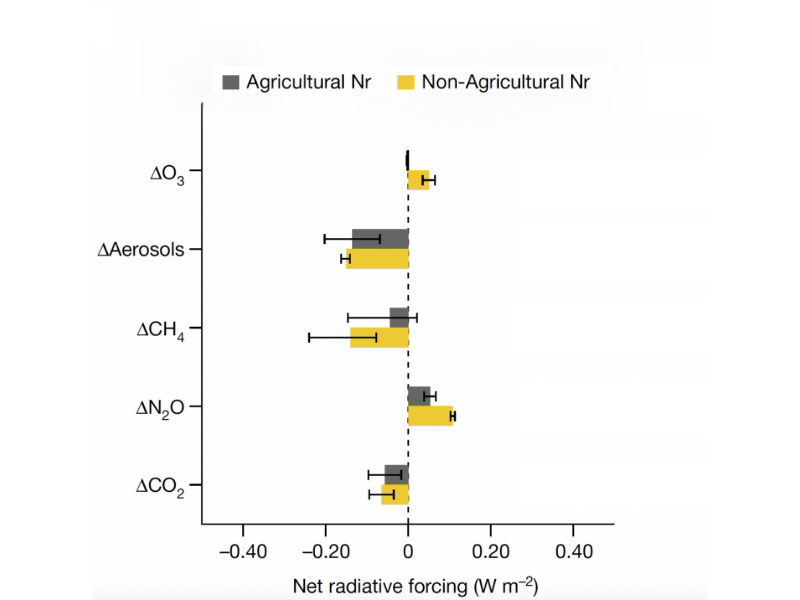From cooling to warming
Nitrogen emissions influence climate change
Nitrogen from fossil fuels and agriculture affect the climate. A research team led by the Max Planck Institute for Biogeochemistry with the participation of the University of Bern has investigated exactly how.

When fossil fuels such as crude oil or coal are burned and fertilisers are used, nitrogen compounds are released. These include the greenhouse gas nitrous oxide or aerosols such as nitrogen oxides and ammonia. These have direct and indirect effects on the Earth's radiation balance - meaning how much radiation from the sun reaches the Earth and how much is emitted from the Earth - and therefore on climate change.
Complex interaction
“The interplay of direct and indirect effects is complex,” says Qing Sun, co-author of the study and postdoctoral researcher at the University of Bern. For example, aerosols reflect solar radiation and thus have a cooling effect on the climate. “In addition, they can contribute to a shorter retention time of the greenhouse gas methane in the atmosphere and thus also have an indirect cooling effect on the climate,” explains Sun. At the same time, the fertilizing effect of nitrogen stimulates plant growth, among other things. “This leads to additional uptake of carbon dioxide by the land biosphere - and thus to a decrease in the CO2 concentration in the atmosphere, which in turn has a cooling effect on the climate,” says Sun, who contributed to the current study with computer simulations of the land biosphere. As a greenhouse gas, nitrous oxide in turn has a warming effect on the climate. According to the researcher, these effects can vary greatly from region to region. This complexity is the reason why the net effect of these nitrogen substances on the climate was previously unclear.
About the person

Qing Sun
is a postdoctoral researcher in the Department of Climate and Environmental Physics at the University of Bern.
Nitrogen compounds have cooled the Earth so far
The results of the study published in the journal “Nature” now close this knowledge gap. “We were able to measure the influence of the individual compounds as well as the overall effect,” says Sun. Overall, the nitrogen compounds have a cooling effect on the climate, according to Sun.

“We must not forget that the cooling effect of climate change is offset by numerous harmful effects,” emphasizes Fortunat Joos, co-author of the study and professor at the Institute of Physics and the Oeschger Centre for Climate Research at the University of Bern. “Air pollution causes over 2,000 premature deaths per year in Switzerland alone and nitrogen is a major contributor to this.”
About the person

Fortunat Joos
is a professor at the Institute of Physics and the Oeschger Center for Climate Research at the University of Bern.
Warming effect could dominate in the future
However, the overall effect of nitrogen compounds could be reversed in the future: This is because the use of fossil fuels will have to be reduced in order to meet the climate targets of the Paris Agreement. This would, however, reduce the concentration of cooling aerosols. "As emissions of the greenhouse gas nitrous oxide from fertilisers remain high in these climate change scenarios, we expect a slight warming contribution from nitrogen overall. However, this is far less than the warming caused by the unchecked use of fossil fuels," says Sun.
Global net climate effects of anthropogenic reactive nitrogen
Oeschger Center for Climate Research OCCR
The Oeschger Center for Climate Research (OCCR) is one of the strategic centers of the University of Bern. It brings together researchers from 14 institutes and four faculties. The OCCR conducts interdisciplinary research at the forefront of climate science. The Oeschger Center was founded in 2007 and bears the name of Hans Oeschger (1927-1998), a pioneer of modern climate research who worked in Bern.
Subscribe to the uniAKTUELL newsletter

Discover stories about the research at the University of Bern and the people behind it.